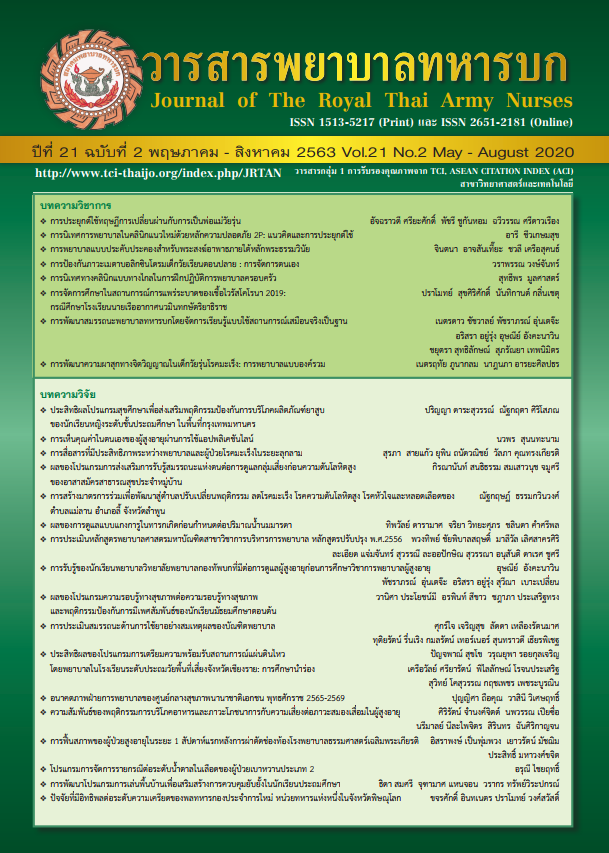Effects of A Self – Efficacy Promoting Program on Caring for Pre-Hypertension Group among Community Health Volunteers
Keywords:
Volunteers, Self-efficacy, Pre-HypertensionAbstract
This quasi-experimental research was to examine the effectiveness of perceived self-efficacy promoting program on caring for pre-hypertension group among community health volunteers, using one group pre-posttest design. The sample consisted of 41 community health volunteers. The instrument of this research consisted of a handbook of a perceived self-efficacy among community health volunteers on caring for pre-hypertension group, risk factor of hypertension assessment form and handbook for advising of caring themselves to pre-hypertension group, using the self-efficacy theory of Bandura (1997) included 1) Mastery experiences 2) Vicarious experiences 3) Verbal persuasion and 4) Emotional and physiological states. Data were analyzed by using percentage, mean, standard deviation, and dependent t-test.
The results revealed that self-efficacy on caring for pre-hypertension group among community health volunteers was higher than before receiving the program at the statistical level of 0.01. Therefore, nurses should apply this program to use on caring for pre-hypertension group.
Downloads
References
Joint National Committee. The seventh report of the joint committee on Prevention, detection, evaluation and treatment of high blood pressure. The Journal of the American Medical Association. 2003, 289: 2560-2572.
Konthapukdi D. Prevalence of Hypertension and Associated Factors in an urban Primary Care Unit. The Thai Journal of Primary Care and Family Medicine. 2010, 2(6): 35-39. (in Thai)
World Health Organization (WHO). A global brief on hypertension silent killer, global public health crisis. Geneva: WHO Press; 2013.
Krumholz, M H. The Worldwide Burden of Hypertension. JAMA. 2017, 317(2): 165-182.
Wu SL, Zhang ZQ, Song SB, Yao TC, Li Y, Wang JL, Wang N, et al. Prevalence of prehypertension and associated cardiovascular risk: two years follow up results. Zhonghua Xin Xua Guan Bing Za Zhi 2012, 38(5): 415-419.
Kim SJ, Lee J, Nam CM, Jee SH, Park IS, Lee KJ, Lee SY. Progression rate from new-onset pre-hypertension to hypertension in Korean adults. Find all citations in this journal (default). Or filter your current search Cir J. 2011, 75(1): 135-140.
Mahasarakham Provincial Public Health, Ministry of Public Health statistics report. 2017. (in Thai).
Bandura, A. Self-efficacy: Toward a unifying theory of behavior change. Psychological Reviews. 1997.
Rachaneeporn Na Thalang N., Detjob N., Yuntapun A.,Setthawong K., Kunaratnpruk S. Effects of a self – efficacy promotion program on metabolic syndrome prevention behaviors among Rangsit University personnel. Journal of Nursing. 2018, 36(1): 172-180.
Cohen, J. Statistical Power Analysis for the behavioral sciences. New York: Lawrence Erlbaum Associates.1988.
Meehanpong P., Chatdokmaiprai K. Assessing Quality of Research Instrument in Nursing Research. Journal of The Royal Thai Army Nurses. 2018, 19(1): 9-15. (in thai)
Songwatthanayuth P., Sirikunwiwat J. Storyline for Health Promoting in Persons with Hypertension. Journal of The Royal Thai Army Nurses. 2019, 20(3): 72-78. (in Thai).
Singtha N., Hingkanont., P. Effects of Enhancing Self-Efficacy Program on Prevention Behavior Among Risk Group of Pre-Hypretension In Bankhok District, Uttaradit Province. Journal of nursing and health science. 2017, 11(3): 81-90. (in Thai).
Wongtib U., Udomvong N., Narin R. Development of Hypertension Prevention Program among People at Risk by Community Participation. Nursing Journal. 2015, 42(4): 12-24. (in Thai).
Wattanameatee R., Hoyrat P. The Effect of abehavior change program on controlling blood pressure level among department of outpatient, chonprathan Hospital hypertensive patients in outpatient. The Southern College Network Journal of Nursing and Public Health. 2017, 4(3): 189–202. (in Thai).
Downloads
Published
How to Cite
Issue
Section
License
บทความหรือข้อคิดเห็นใดใดที่ปรากฏในวารสารพยาบาลทหารบกเป็นวรรณกรรมของผู้เขียน ซึ่งบรรณาธิการหรือสมาคมพยาบาลทหารบก ไม่จำเป็นต้องเห็นด้วย
บทความที่ได้รับการตีพิมพ์เป็นลิขสิทธิ์ของวารสารพยาบาลทหารบก
The ideas and opinions expressed in the Journal of The Royal Thai Army Nurses are those of the authors and not necessarily those
of the editor or Royal Thai Army Nurses Association.






